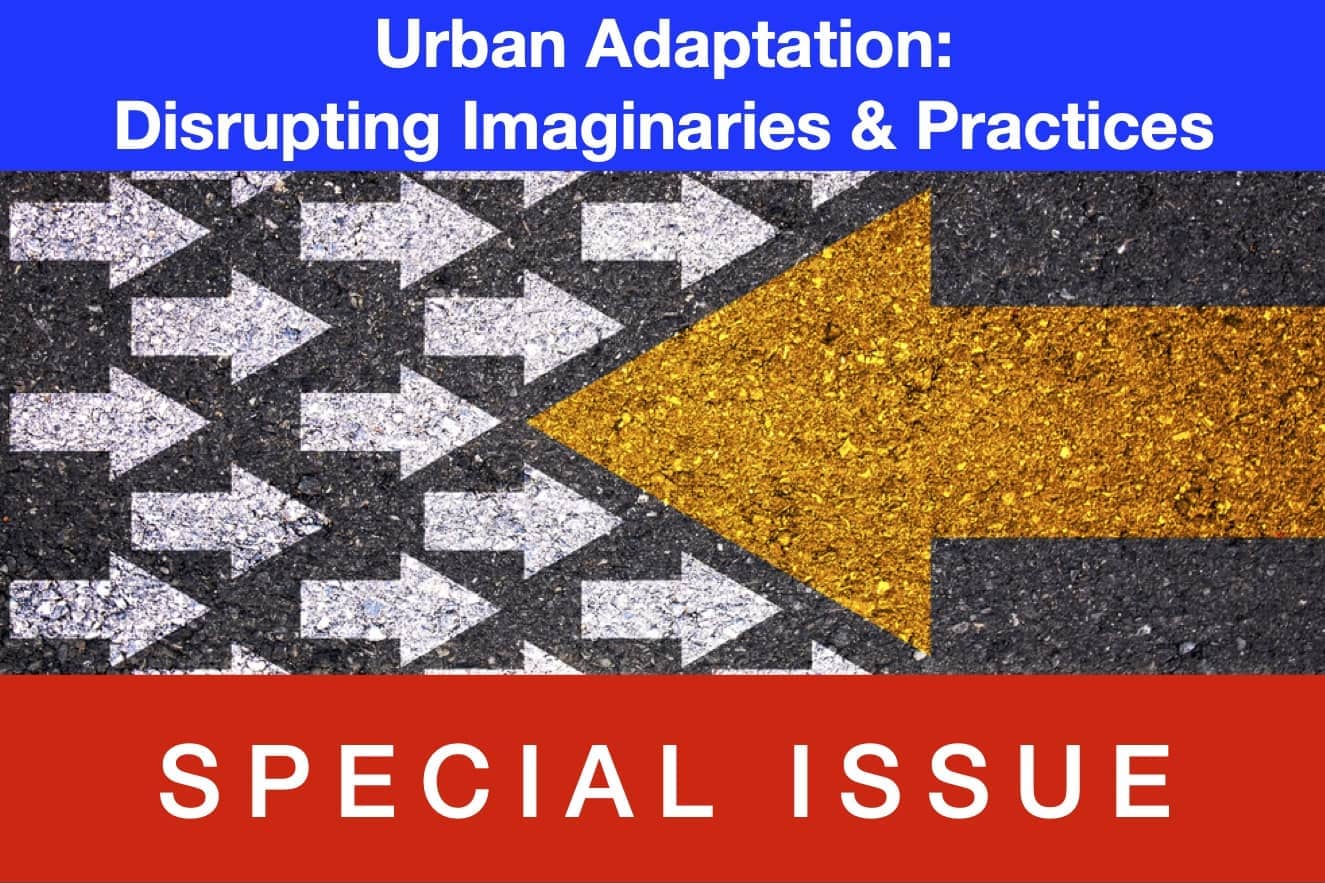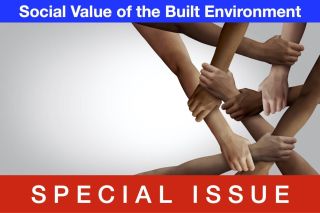
www.buildingsandcities.org/journal-content/special-issues/urban-adaptation-disrupting-imaginaries2.html
Urban Adaptation: Disrupting Imaginaries & Practices

How can we create a more pluralistic, inclusive approach to urban climate adaptation? How can ill-suited approaches be disrupted?
Current imaginaries (ways to understand and envisage how adaptation should take place) and practices need to be revised to provide social justice and reflect local needs. This special issue focuses on how inappropriate / inadequate urban adaptation imaginaries and practices can be identified and disrupted to provide more inclusive, socially just approaches to urban adaptation. Actions for urban climate adaptation (in physical, social, political, legal dimensions) are needed to break with the status quo, reduce systemic vulnerabilities and increase coping capacities (resilience) to face climate change impacts at scale.
Guest editors: Vanesa Castán Broto, Marta Olazabal & Gina Ziervogel
Urban adaptation relates to how people imagine plausible and desirable urban futures. Adaptation imaginaries refer to collective representations of how society should act and towards which goal in the context of unprecedented climate change impacts. However, the existing narratives of adaptation action tend to entrench actions that may not be beneficial in the long term and may lead to maladaptation and inequities. This is the case, for example, of flood protection barriers that displace natural barriers, such as mangroves, or water distribution networks that supply water by depleting reserves elsewhere. New adaptation imaginaries will facilitate just adaptation and enable radical changes in the relationship between humans and their environment. One step to do so is to disrupt the dominant understandings of adaptation.
This special issue demonstrates the multiple ways in which such disruption can happen. Three areas where disruption can happen are:
- in international political narratives
- the relationship between climate change and urbanisation
- the implementation of action on the ground when action encounters the realities of infrastructure and service delivery.
This special issue argues that the first step in delivering climate change adaptation is to foster new ways of imagining what adaptation is needed and how it should be delivered. This includes a process of:
- understanding the assumptions embedded in dominant imaginaries of urban adaptation
- understanding how urbanisation changes how we imagine urban areas and their resilience
- harnessing existing radical attempts to reimagine adaptation and adaptation practices
- developing examples and experiences of applying urban adaptation alternatives in policy and practices
Table of contents
Disrupting the imaginaries of urban action to deliver just adaptation [editorial]
V. Castán-Broto, M. Olazabal & G. Ziervogel
Suburban climate adaptation governance: assumptions and imaginaries affecting peripheral municipalities
L. Cerrada Morato
Normative future visioning: a critical pedagogy for transformative adaptation
T. Comelli, M. Pelling, M. Hope, J.
Ensor, M.E. Filippi, E.Y. Menteşe & J. McCloskey
How hegemonic discourses of sustainability influence urban climate action
V. Castán Broto, L. Westman &
P. Huang
Nature for resilience reconfigured: global-to-local translation of frames in Africa
K. Rochell, H. Bulkeley & H.
Runhaar
Maintaining a city against nature: climate adaptation in Beira [Mozambique]
J. Schubert
Urban shrinkage as a catalyst for transformative adaptation
L. Mabon, M. Sato & N. Mabon
Equity and justice in urban coastal adaptation planning: new evaluation framework
T. Okamoto & A. Doyon
Disrupt and unlock? The role of actors in urban adaptation path-breaking
J. Teebken
The jobs of climate adaptation
T. Denham, L. Rickards & O. Ajulo
Latest Peer-Reviewed Journal Content
Acceptability of sufficiency consumption policies by Finnish households
E Nuorivaara & S Ahvenharju
Key factors for revitalising heritage buildings through adaptive reuse
É Savoie, J P Sapinski & A-M Laroche
Cooler streets for a cycleable city: assessing policy alignment
C Tang & J Bush
Understanding the embodied carbon credentials of modern methods of construction
R O'Hegarty, A McCarthy, J O'Hagan, T Thanapornpakornsin, S Raffoul & O Kinnane
The changing typology of urban apartment buildings in Aurinkolahti
S Meriläinen & A Tervo
Embodied climate impacts in urban development: a neighbourhood case study
S Sjökvist, N Francart, M Balouktsi & H Birgisdottir
Environmental effects of urban wind energy harvesting: a review
I Tsionas, M laguno-Munitxa & A Stephan
Office environment and employee differences by company health management certification
S Arata, M Sugiuchi, T Ikaga, Y Shiraishi, T Hayashi, S Ando & S Kawakubo
Spatiotemporal evaluation of embodied carbon in urban residential development
I Talvitie, A Amiri & S Junnila
Energy sufficiency in buildings and cities: current research, future directions [editorial]
M Sahakian, T Fawcett & S Darby
Sufficiency, consumption patterns and limits: a survey of French households
J Bouillet & C Grandclément
Health inequalities and indoor environments: research challenges and priorities [editorial]
M Ucci & A Mavrogianni
Operationalising energy sufficiency for low-carbon built environments in urbanising India
A B Lall & G Sethi
Promoting practices of sufficiency: reprogramming resource-intensive material arrangements
T H Christensen, L K Aagaard, A K Juvik, C Samson & K Gram-Hanssen
Culture change in the UK construction industry: an anthropological perspective
I Tellam
Are people willing to share living space? Household preferences in Finland
E Ruokamo, E Kylkilahti, M Lettenmeier & A Toppinen
Towards urban LCA: examining densification alternatives for a residential neighbourhood
M Moisio, E Salmio, T Kaasalainen, S Huuhka, A Räsänen, J Lahdensivu, M Leppänen & P Kuula
A population-level framework to estimate unequal exposure to indoor heat and air pollution
R Cole, C H Simpson, L Ferguson, P Symonds, J Taylor, C Heaviside, P Murage, H L Macintyre, S Hajat, A Mavrogianni & M Davies
Finnish glazed balconies: residents' experience, wellbeing and use
L Jegard, R Castaño-Rosa, S Kilpeläinen & S Pelsmakers
Modelling Nigerian residential dwellings: bottom-up approach and scenario analysis
C C Nwagwu, S Akin & E G Hertwich
Mapping municipal land policies: applications of flexible zoning for densification
V Götze, J-D Gerber & M Jehling
Energy sufficiency and recognition justice: a study of household consumption
A Guilbert
Linking housing, socio-demographic, environmental and mental health data at scale
P Symonds, C H Simpson, G Petrou, L Ferguson, A Mavrogianni & M Davies
Measuring health inequities due to housing characteristics
K Govertsen & M Kane
Provide or prevent? Exploring sufficiency imaginaries within Danish systems of provision
L K Aagaard & T H Christensen
Imagining sufficiency through collective changes as satisfiers
O Moynat & M Sahakian
US urban land-use reform: a strategy for energy sufficiency
Z M Subin, J Lombardi, R Muralidharan, J Korn, J Malik, T Pullen, M Wei & T Hong
Mapping supply chains for energy retrofit
F Wade & Y Han
Operationalising building-related energy sufficiency measures in SMEs
I Fouiteh, J D Cabrera Santelices, A Susini & M K Patel
Promoting neighbourhood sharing: infrastructures of convenience and community
A Huber, H Heinrichs & M Jaeger-Erben
New insights into thermal comfort sufficiency in dwellings
G van Moeseke, D de Grave, A Anciaux, J Sobczak & G Wallenborn
'Rightsize': a housing design game for spatial and energy sufficiency
P Graham, P Nourian, E Warwick & M Gath-Morad
Implementing housing policies for a sufficient lifestyle
M Bagheri, L Roth, L Siebke, C Rohde & H-J Linke
The jobs of climate adaptation
T Denham, L Rickards & O Ajulo
Structural barriers to sufficiency: the contribution of research on elites
M Koch, K Emilsson, J Lee & H Johansson
Disrupting the imaginaries of urban action to deliver just adaptation [editorial]
V Castán-Broto, M Olazabal & G Ziervogel
Nature for resilience reconfigured: global- to-local translation of frames in Africa
K Rochell, H Bulkeley & H Runhaar
How hegemonic discourses of sustainability influence urban climate action
V Castán Broto, L Westman & P Huang
Fabric first: is it still the right approach?
N Eyre, T Fawcett, M Topouzi, G Killip, T Oreszczyn, K Jenkinson & J Rosenow
Social value of the built environment [editorial]
F Samuel & K Watson
Understanding demolition [editorial]
S Huuhka
Data politics in the built environment [editorial]
A Karvonen & T Hargreaves



Latest Commentaries
Decolonising Cities: The Role of Street Naming
During colonialisation, street names were drawn from historical and societal contexts of the colonisers. Street nomenclature deployed by colonial administrators has a role in legitimising historical narratives and decentring local languages, cultures and heritage. Buyana Kareem examines street renaming as an important element of decolonisation.
Integrating Nature into Cities
Increasing vegetation and green and blue spaces in cities can support both climate change mitigation and adaptation goals, while also enhancing biodiversity and ecological health. Maibritt Pedersen Zari (Auckland University of Technology) explains why nature-based solutions (NbS) must be a vital part of urban planning and design.